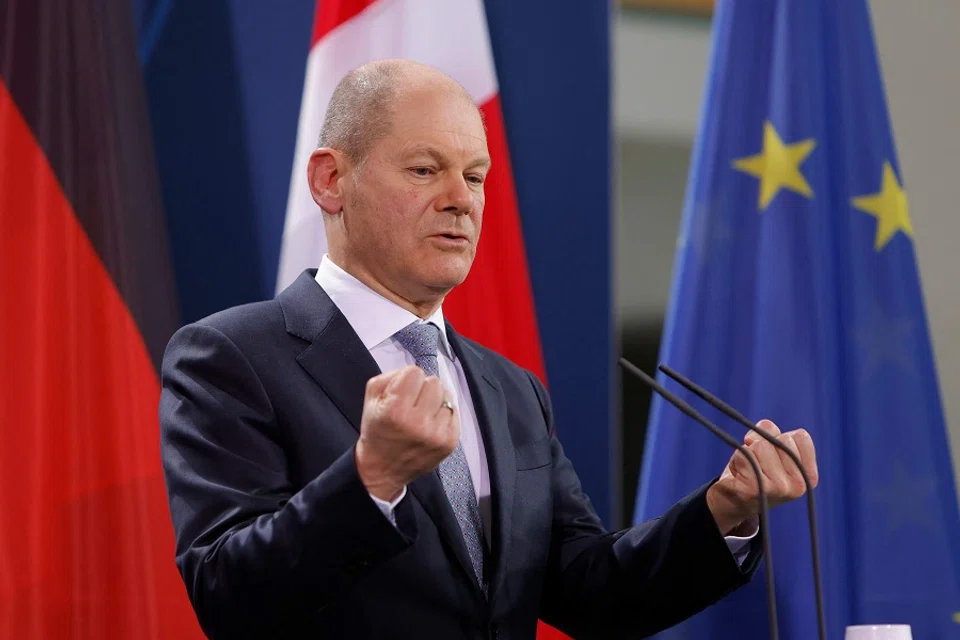Will Germany's new government be tougher on China?
After 16 years in office, Angela Merkel handed over the German chancellery to Olaf Scholz in December. How should we evaluate her legacy regarding China and, with the new German government almost two months in, what can be said about the future of Germany's China policy?

Sixteen years and 16 days might not seem like an extraordinarily long time from the perspective of policy makers in China, a country that organises its policy planning with 15-year plans. But the Merkel-era shaped a whole generation of Germans, if not Europeans.
Angela Merkel was not only the first female German chancellor, she also almost became the longest-serving one too (she missed this title by ten days). And when she handed over power to her successor Olaf Scholz from the social democratic party SPD in December, she still was the most popular politician among Germans.
Even though The New York Times declared her to be the "leader of the free world" after US-Americans elected Donald Trump as their next president, her stance toward China became an ever more disputed issue - at home and abroad. While she started her chancellorship with a reception of the Dalai Lama in 2007, Merkel became increasingly silent on human rights abuses in China when speaking in public and stuck to the creed "change through trade" until the end of her tenure.
Her total of 12 visits to China indicate that Merkel's priority was to maintain dialogue with the quickly rising world power. When she initiated government consultations with China in 2011, an instrument normally exclusively reserved for close allies, some of her European colleagues were not amused. Critics say that in her China policy, Merkel prioritised economic considerations and neglected a long-term strategic evaluation of the geopolitical challenges imposed by China.

In 2020, at the end of Germany's presidency of the Council of the EU, Merkel was also the driving force behind the negotiations for the Comprehensive Agreement on Investment (CAI) between the EU and China. If this was an attempt to formalise her approach towards China on a European level and beyond her term, it did not work out. Due to reciprocal sanctions between the EU and China, the CAI is currently put on the back burner.
However, the coalition agreement of Germany's new government does not read like a continuation of the Merkel years.
China a competitor, partner and strategic rival
And as President Vladimir Putin escalates tensions with Ukraine, German foreign policy makers are busy finding a common position on Russia. Even if both Chancellor Scholz and Annalena Baerbock, the new German foreign minister from the environmentalist party The Greens, have talked to their Chinese counterparts in past weeks, China is currently not their priority.
The future of Germany's relations with China worried Merkel during her last days in office - at least this was revealed from the handover of power to her successor. Scholz himself did not take clear geopolitical positions during the election campaign. Shortly after he took office in December, some top diplomats in Berlin and Brussels leaked a story about Scholz asking Charles Michel, president of the European Council, to deliver this message to Xi Jinping: "He can expect continuity from me."
However, the coalition agreement of Germany's new government does not read like a continuation of the Merkel years. Not a surprise, as two of the coalition parties, the liberal FDP and The Greens, have a strong focus on human rights. They were also very explicit on a variety of critical China issues in their party programmes, and even during their past years in opposition.

The positions mapped out in the agreement include the full programme of topics sensitive to Beijing: human rights violations in Xinjiang need to be put on the agenda, the constitutional principle of "one country two systems" in Hong Kong must be reinforced, changes of the status quo in the Taiwan strait can only take place based on mutual agreement, territorial conflicts in the South and East China Sea must end in accordance with international sea law, and finally, reciprocity must be enhanced when it comes to the ratification of the CAI.
While Germany's last foreign minister, Heiko Maas, already used the EU's triad of China being simultaneously a competitor, partner and strategic rival, Germany's new government now included this wording in the coalition agreement (the last coalition agreement 2018 referred to China exclusively as a strategic partner).
In addition, one of the new junior ministers in the foreign office already made clear that Germany will from now on look "strategically" at the partnership share of this threefold relationship and examine if it is compatible with Germany's own "interests" and "values" - and especially, if it "yields results".
The new minister for education and research, Bettina Stark-Watzinger from the liberal coalition party FDP, also called for a cautious approach when cooperating with China in research and development. It is rather new for ministers from government departments other than the foreign or economics ministry or the chancellery to make a public - critical - statement about China.

A recurring theme in the coalition agreement is the "Europeanisation of German foreign policy". So far, it looks like Berlin also walks the talk when it comes to China: when Beijing increased its pressure on German companies to stop using parts produced in Lithuania in its production chain (a reaction to Lithuania's Taiwan policy), junior ministers from both the foreign office and the ministry for economic affairs and climate action visited its European partner to coordinate the response. This is a clear signal to China that Germany will get tougher with China for driving a wedge between European countries.
Chancellor lighter, foreign minister harsher on China?
The fact that Chancellor Olaf Scholz only raised the issue in his phone call with Li Keqiang - after he was criticised for remaining silent on the topic in his first phone call with Chinese President Xi Jinping - partly contradicts the tone set in the coalition treaty.
Yet in his first government declaration, a format in which the chancellor gives proof of its activities and responds to questions from members of the parliament, Scholz emphasised that Germany must take the "real China" into consideration when thinking about its China policy. While he emphasised the importance to look at human rights abuses in China and base the strong economic ties between both countries on a level playing field, he also offered to cooperate on global challenges like the climate crisis, pandemics and arms control.
In the end, however, the last authority to issue directives lies with the chancellor.
The fact that Scholz kept a rather low profile on China so far, might be compensated by his foreign minister, Annalena Baerbock. Baerbock already made clear that to her "remaining silent is not diplomacy".
In her first weeks in office, she declared that even if European coordination on this topic was still pending, she would definitely not travel to Beijing for the Olympic Winter Games. In addition, she picked up the threads of US President Biden's rhetoric regarding an import ban of products made by forced labour in Xinjiang and called the CAI a "farce". Already early in her election campaign (Baerbock was running as chancellor candidate for The Greens), she stated that the best way to approach China would be with a mixture of "dialogue and hardship".
So far, the foreign minister has been clearer and louder in her positions on China than Scholz.

In the end, however, the last authority to issue directives lies with the chancellor. In addition, Baerbock is aware that one of her top priorities - international climate policy - will only be successful with China on board. It will be a difficult balancing act to engage with China on the issue, while simultaneously competing for innovations in this future market, and criticising the country's human rights abuses.
Stakeholders shaping Germany's China policy
And the opposition? At least the new head of Merkel's Christian democratic party CDU, seems to agree with the new government in key aspects. In an interview with DER SPIEGEL, he said that the West became too dependent on China and underlined the need for a European China policy.
The foreign office of Annalena Baerbock will be in the lead to draft such a strategy in the upcoming months for Germany - one of the objectives formulated in the coalition agreement. Its design will mainly depend on developments within the EU, such as the future of the French-German axis during and after elections in France. However, Baerbock and her ministry will also reach out to the private sector, NGOs and think tanks to prepare such a strategy.
If the strategy's architects take German public opinion into consideration, German-China relations might get even chillier.

If the strategy's architects take German public opinion into consideration, German-China relations might get even chillier. As a recent poll of Körber-Stiftung shows, a majority of Germans (55%) considers China's international influence not only negatively but also perceives China as a threat to German values (74%). When it comes to tackling the climate crisis, only 8% of Germans are convinced that China is strongly engaged (14% say the same about the US).
Some German representatives of the private sector, in contrast, set a different tone. Roland Busch, Siemens CEO and chair of the Asia-Pacific Committee of the German Economy, recently declared that a "confrontative foreign policy" with China will not deliver solutions.
With its G7 presidency, the EU-China summit planned for early spring and the next Sino-German government consultations on the horizon, Germany's new government will have more than one occasion to prove that it takes the targeted adaptation of its China policy seriously, not only on paper but also in practice.
Related: Germany's China policy: Will economic interests override values? | Germany between the US and China | How Germany can help ensure peace in the Taiwan Strait | Securing its place in the world economic order: The EU can't afford to wait for the US | Chinese academic: China-EU investment deal is of great strategic value to China



![[Photos] Fact versus fiction: The portrayal of WWII anti-Japanese martyrs in Taiwan](https://cassette.sphdigital.com.sg/image/thinkchina/3494f8bd481870f7c65b881fd21a3fd733f573f23232376e39c532a2c7593cbc)

